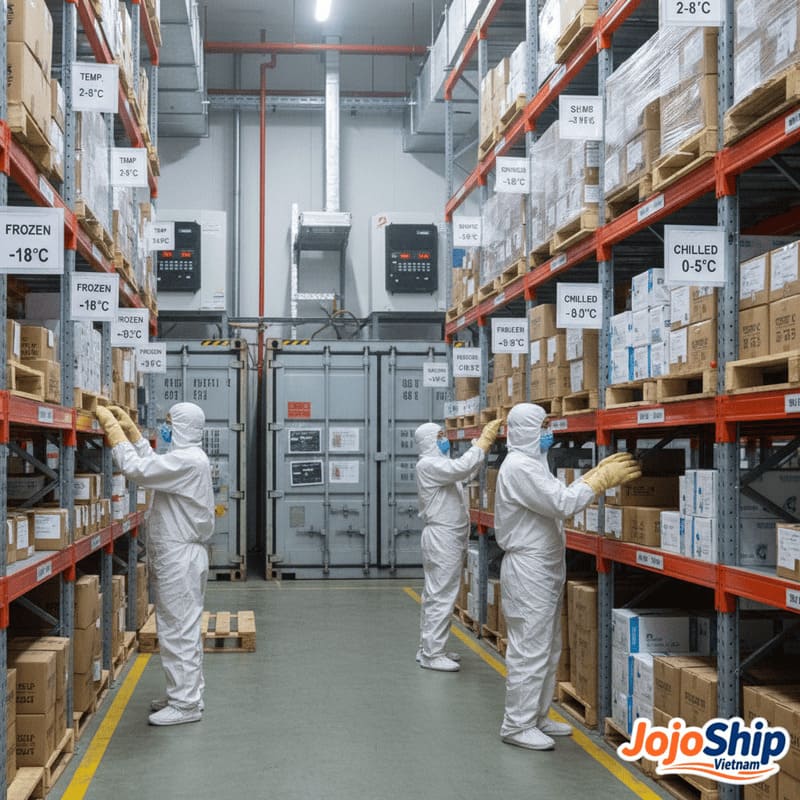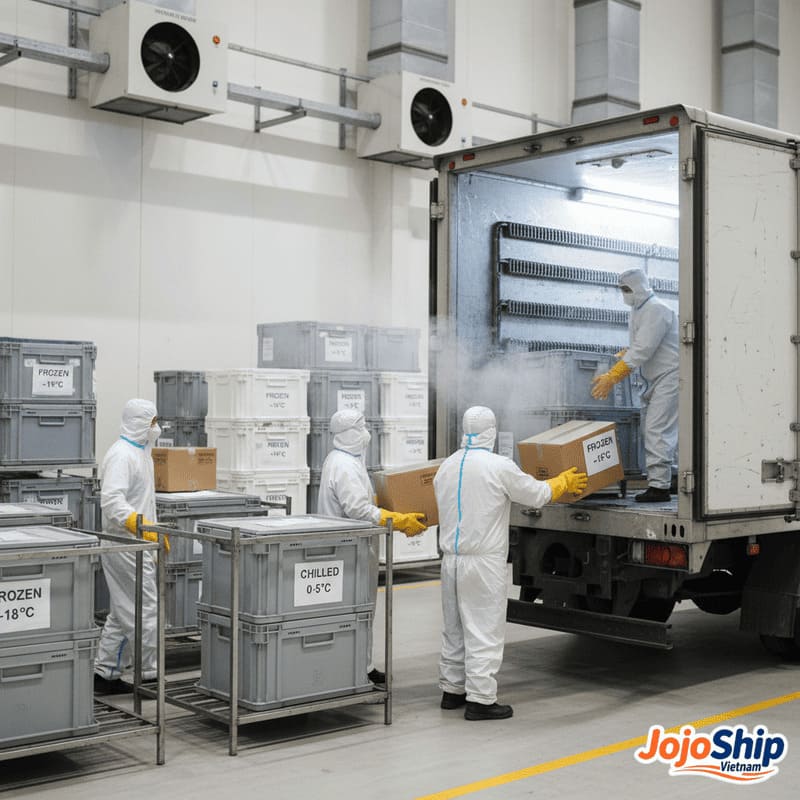Shipping temperature-sensitive products from Vietnam presents unique challenges. Many businesses lose valuable cargo due to improper handling, temperature fluctuations, or using freight forwarders without specialized cold chain expertise.
The top freight forwarders handling temperature-controlled cargo from Vietnam include JojoShip Vietnam, King Freight Logistics Vietnam, ALS Vietnam, DHL Express Vietnam, Arctic Wolf Global, and Maersk. These companies provide specialized refrigerated container shipping, temperature monitoring systems, and dedicated cold chain solutions for pharmaceuticals, food products, and other sensitive items.

I've been working in Vietnam's logistics sector for years, and the demand for reliable temperature-controlled shipping has grown dramatically. From pharmaceuticals to premium seafood, temperature-sensitive exports require specialized handling that not all freight forwarders can provide.
Is DHL Temperature Controlled For Vietnamese Exports?
Many shippers assume major carriers like DHL automatically handle temperature-sensitive cargo properly. This misconception has led to costly product damage when specific temperature requirements aren't communicated or the wrong service level is selected.
Yes, DHL offers temperature-controlled shipping solutions from Vietnam with services ranging from passive cooling to active refrigeration. Their DHL Medical Express and DHL Same Day Thermial services maintain temperatures between 2-8°C, 15-25°C, or frozen conditions below -20°C, particularly for pharmaceutical and healthcare products.

When I first started helping clients ship temperature-sensitive products from Vietnam, I learned that DHL actually offers several specialized temperature-controlled options. Their services go well beyond the standard shipping most people associate with the DHL brand.
DHL Temperature-Controlled Services in Vietnam
| Service Type | Temperature Range | Best For | Additional Features |
|---|---|---|---|
| DHL Medical Express1 | 2°C to 8°C | Pharmaceuticals, vaccines | GDP-compliant, specialized packaging |
| DHL Same Day Thermal | -20°C to 25°C | Time-critical medical samples | Door-to-door, temperature-controlled vehicles |
| DHL Life Sciences | Multiple ranges | Biotech products, clinical trials | End-to-end visibility, compliance documentation |
| DHL Ocean Freight Reefer | -25°C to 30°C | Large volume temperature-sensitive cargo | Full container load options, monitoring |
| DHL Air Freight | 2°C to 8°C, 15°C to 25°C | Urgent pharmaceuticals, perishables | Priority boarding, thermal blankets |
DHL's temperature-controlled services in Vietnam include specialized packaging solutions designed to maintain specific temperature ranges throughout transit. Their Thermonet service provides real-time temperature monitoring2 and proactive intervention if any deviations occur during transport.
I've worked with pharmaceutical clients who require strict adherence to Good Distribution Practices (GDP), and DHL's certified facilities in Ho Chi Minh City and Hanoi meet these rigorous standards. They maintain clean rooms for pharmaceutical handling and offer temperature-mapped storage areas that ensure consistent conditions.
For smaller shipments requiring temperature control, DHL uses validated packaging solutions with phase-change materials3 that maintain temperatures for extended periods. This is particularly useful for Vietnam's exports of biological samples, vaccines, and high-value pharmaceuticals that require consistent cold chain management.
However, it's important to note that using DHL's temperature-controlled services requires clear communication about your specific requirements. I always recommend that clients provide detailed temperature specifications and product stability data to ensure the right solution is implemented.
Which Type of Cargo Requires Temperature-Controlled Transportation From Vietnam?
Many exporters underestimate which products need temperature protection. I've seen countless shipments compromised because businesses didn't realize their products required temperature-controlled logistics4 until it was too late.
Products requiring temperature-controlled transportation from Vietnam include pharmaceuticals (2-8°C), vaccines (-70°C to 8°C), fresh seafood (-1°C to 2°C), tropical fruits (7-13°C), cut flowers (1-4°C), specialty chocolates (15-18°C), certain electronics and chemicals (15-25°C), and frozen foods (below -18°C).

Vietnam has become a major exporter of temperature-sensitive goods, and I've helped clients transport everything from delicate orchids to advanced pharmaceuticals. Each product category has its own specific temperature requirements that must be maintained throughout the logistics process.
Temperature Requirements for Vietnamese Exports
| Product Category | Temperature Range | Challenges | Consequences of Temperature Breach |
|---|---|---|---|
| Pharmaceuticals | 2°C to 8°C | High humidity, long transit times | Loss of efficacy, regulatory non-compliance |
| Fresh Seafood | -1°C to 2°C | Short shelf life, quality degradation | Spoilage, bacterial growth, rejected shipments |
| Tropical Fruits | 7°C to 13°C (varies) | Ethylene production, ripening control | Premature ripening, quality deterioration |
| Cut Flowers | 1°C to 4°C | Sensitivity to temperature fluctuations | Wilting, shortened vase life, color changes |
| Specialty Chocolate | 15°C to 18°C | Melting risk in Vietnam's climate | Bloom formation, texture changes, melting |
| Electronics | 15°C to 25°C | Condensation risk, component sensitivity | Corrosion, short circuits, warranty issues |
| Vaccines | -70°C to 8°C (varies) | Ultra-cold requirements, strict monitoring | Complete loss of effectiveness |
| Frozen Foods | Below -18°C | Thaw risk during transfers | Texture changes, microbial growth, rejection |
Vietnam's tropical climate makes temperature control particularly challenging. When I coordinate shipments from manufacturers in industrial zones around Hanoi or Ho Chi Minh City, we must consider that ambient temperatures regularly exceed 30°C with high humidity, creating significant risks for temperature-sensitive products.
Beyond the obvious perishables like Vietnam's famous seafood exports (pangasius, shrimp, and tuna), many other products require careful temperature management. Vietnam's growing pharmaceutical manufacturing sector produces medications that must maintain the cold chain5 to preserve their efficacy.
Electronics exports are another crucial category requiring temperature control. Vietnam has become a major electronics manufacturing hub, and components like semiconductors, circuit boards, and precision equipment can be damaged by condensation or temperature extremes. Many clients don't realize their electronics require temperature-controlled shipping until they experience problems.
Agricultural exports present unique challenges. Vietnam's premium fruits like dragon fruit, mangosteen, and lychee require precise temperature ranges to maintain freshness without causing chill damage. Flowers and ornamental plants, a growing export category from Vietnam's highland regions, are extremely sensitive to temperature fluctuations.
I've found that working with specialized freight forwarders who understand these product-specific requirements is essential for successful temperature-controlled shipping from Vietnam.
What Is A Temperature Controlled Shipper In Vietnam?
The term "temperature-controlled shipper" causes confusion. Many businesses think it refers only to the freight forwarder, missing the critical distinction between the various components of temperature-controlled logistics.
A temperature-controlled shipper in Vietnam is a specialized freight forwarder with equipment, facilities, and expertise to maintain specific temperature ranges throughout the supply chain. This includes refrigerated containers, cold storage warehouses, temperature-monitored vehicles, validated packaging, and trained personnel who understand cold chain requirements for different products.

Over my years working in Vietnam's logistics sector, I've seen the temperature-controlled shipping market evolve significantly. Today's sophisticated cold chain solutions6 bear little resemblance to the basic refrigerated shipping of the past.
Components of Temperature-Controlled Shipping in Vietnam
| Component | Function | Technology | Vietnam-Specific Considerations |
|---|---|---|---|
| Refrigerated Containers7 | Maintain temperatures during ocean transit | Integrated cooling units, temperature logging | Power stability at Vietnamese ports, pre-cooling protocols |
| Cold Storage Warehouses8 | Temperature-stable storage before/after transit | Multi-temperature zones, backup power | Limited capacity in some regions, qualification standards |
| Temperature-Controlled Vehicles9 | Last-mile delivery with temperature integrity | Refrigerated trucks, thermal blankets | Traffic congestion affecting runtime, rural access limitations |
| Packaging Solutions | Primary protection for smaller shipments | Insulated boxes, gel packs, phase change materials | Local availability of specialized materials, tropical climate effects |
| Monitoring Systems | Continuous temperature tracking | IoT sensors, GPS-enabled trackers | Connectivity issues in remote areas, import regulations for technology |
| Quality Management Systems10 | Procedures ensuring temperature compliance | SOPs, training, documentation | Varying standards of implementation, staff training needs |
A true temperature-controlled shipper in Vietnam11 must address every link in the cold chain. When I help clients select partners, I look for forwarders that have invested in comprehensive infrastructure rather than just having access to reefer containers.
The best temperature-controlled shippers in Vietnam maintain their own facilities or have validated partnerships with specialized providers. For example, companies like King Freight Logistics Vietnam and JojoShip Vietnam have developed dedicated cold chain divisions with specialized equipment and training.
Temperature mapping is another critical capability. Effective cold chain providers in Vietnam regularly analyze temperature patterns within their facilities and vehicles to identify potential risk points. This becomes especially important during Vietnam's hot season when ambient temperatures regularly exceed 35°C.
Quality management systems distinguish true temperature-controlled shippers from those who merely offer basic refrigeration. I look for providers who follow Good Distribution Practices (GDP) and can demonstrate their compliance through documentation and certifications.
The concept of temperature excursion management12 is also fundamental. The best providers don't just monitor temperatures—they have established protocols for responding to any deviation. When shipping pharmaceuticals from Vietnam, I work with forwarders who can demonstrate their excursion response procedures and have backup systems in place.
Finally, documentation and regulatory compliance set professional temperature-controlled shippers apart. Vietnam's export requirements for temperature-sensitive products are increasingly strict, especially for pharmaceuticals and food products. Working with forwarders who understand these requirements saves countless headaches at customs.
Conclusion
When shipping temperature-sensitive cargo from Vietnam, work with specialized providers like JojoShip Vietnam, King Freight Logistics, or DHL's dedicated services. These forwarders offer the necessary equipment, monitoring capabilities, and expertise to maintain product integrity throughout transit, preventing costly temperature excursions and ensuring regulatory compliance.
-
Discover how DHL Medical Express can protect your pharmaceuticals and vaccines with strict temperature control and compliance features. ↩
-
Explore how real-time temperature monitoring with Thermonet can prevent costly product damage during international shipping. ↩
-
Find out how advanced packaging with phase-change materials can maintain temperature stability for sensitive exports. ↩
-
Learn how temperature-controlled logistics protect sensitive goods and why it's crucial for Vietnamese exporters to avoid costly losses. ↩
-
Understanding the cold chain is vital for maintaining product quality and compliance, especially for pharmaceuticals and perishables. ↩
-
Discover advanced cold chain technologies and practices that ensure safe transport of temperature-sensitive goods in Vietnam. ↩
-
Understand the role of refrigerated containers in maintaining product quality during ocean transit and the challenges faced at Vietnamese ports. ↩
-
Explore the importance of cold storage facilities and how their limitations can impact your logistics strategy in Vietnam. ↩
-
Find out how specialized vehicles maintain temperature integrity and overcome local delivery challenges in Vietnam. ↩
-
Learn why robust quality management systems are essential for compliance and reliability in cold chain logistics. ↩
-
Learn how specialized shippers maintain product integrity in Vietnam’s climate and why choosing the right partner is crucial for your supply chain. ↩
-
Discover the protocols and backup systems that protect sensitive shipments from temperature deviations in Vietnam. ↩




